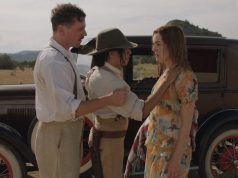Even Bill Hicks’ adoring mother wasn’t sure what to make of him. “Bill was — I don’t know — he was interesting,” she says, in “American: The Bill Hicks Story,” the documentary about her comedian son, who died of cancer in 1994 at the age of 32. This inability to put a label on Hicks, which came in part because his style changed so much over the course of his career, might have been what kept him from achieving the superstardom that his admirers always felt he deserved. “American,” a lively and polished effort by British filmmakers Matt Harlock and Paul Thomas, seeks to show the world what made Hicks so special.
This may be the most thorough analysis Hicks will ever get. Made with full cooperation from his mother and siblings and many of his closest friends, the film boasts ample new interviews, clips of Hicks’ performances, and a ton of family photos and home movies. (The photos have been semi-animated, to give them depth and movement — unnecessary, maybe, but it keeps the film’s visual side from getting too static.) We get about as clear a picture of Hicks’ personality as anyone who knew him ever got, and a taste of what his fans saw in him as a performer. His tragic, too-soon death — which came after he stopped drinking and doing drugs (a dark irony he would have appreciated) — probably enhanced his legacy, but it’s apparent he’d have been beloved even if he’d lived.
Hicks and his older brother and sister were brought up in a fairly strict but loving religious environment. “People say the Hickses were raised fundamentalist Christians, but no,” his brother, Steve, says. “We were raised Southern Baptist, and that’s much worse.” Hicks started doing stand-up comedy at the age of 16 at a club in Houston, working with a partner, his friend Dwight Slade. After Slade’s family moved away, Hicks struck out on his own. Clips of these early performances show him to be astonishingly self-assured, doing character-based routines and telling stories about his family and school life. The strident, profane Bill Hicks that most people know is nowhere to be seen.
He moved to Los Angeles at age 19, reuniting with Slade and trying for two years to break into the entertainment industry as writers. Oddly, it wasn’t until Hicks moved out of L.A. and back to Houston, at 21, that he get involved with drugs and alcohol. Once he got involved, though, he was committed. His friends remember him speaking very seriously about the potential of psychedelic mushrooms to expand one’s mind. His drinking and drug use found their way into his act, too, both in content (he had some funny observations about the way drugs are portrayed in the news media) and in form: It became a game for comedy-club audiences to see how much they could get him to drink while he was onstage.
Predictably, Hicks’ substance abuse got out of hand; he went from lovable drunk to unreliable alcoholic. He sobered up in 1988, and his stage persona evolved into the one most fans are familiar with. The footage shown here suggests he didn’t do many Seinfeld-type, “What’s the deal with everyday annoyances?” jokes, focusing instead on larger issues. He would rail against things like organized religion and consumerism, often expressing his opinions in a way that was both persuasive and funny. He was unabashedly patriotic but intensely critical of government. (On the military’s “Don’t Ask, Don’t Tell” policy: “We don’t want any gay people around while we’re killing kids.”)
Harlock and Thomas, who spent three years making “American,” include footage from Hicks’ later performances that shows him to be less funny and more angry. He was still making his points; he just wasn’t making them in a humorous way anymore. The filmmakers certainly know more about Hicks’ work than I do. Is this representative of his last couple years? Did he really lose sight of his original goal — being funny — in his quest to be heard? Or did his fans, Harlock and Thomas included, think this vitriolic, opinion-page stuff was funny too? That’s your discussion question for after the movie.
My only quibble with the film as a film is that we seldom see the people being interviewed — their voices are played over other images instead — and their names appear onscreen only once or twice. Consequently, we often can’t identify whose voice we’re hearing except by contextual clues. Is that Hicks’ brother? Dwight Slade? Someone else whose name we forgot? Help us out here.
Someone who’s been exposed to Hicks and simply didn’t care for his style probably will not be converted by this. Like many documentaries of this genre, it was made by fans, for fans. Even casual observers, though, can see that Hicks was talented, a conflicted young man who deserved more success than he ever got.
B (1 hr., 42 min.; )





